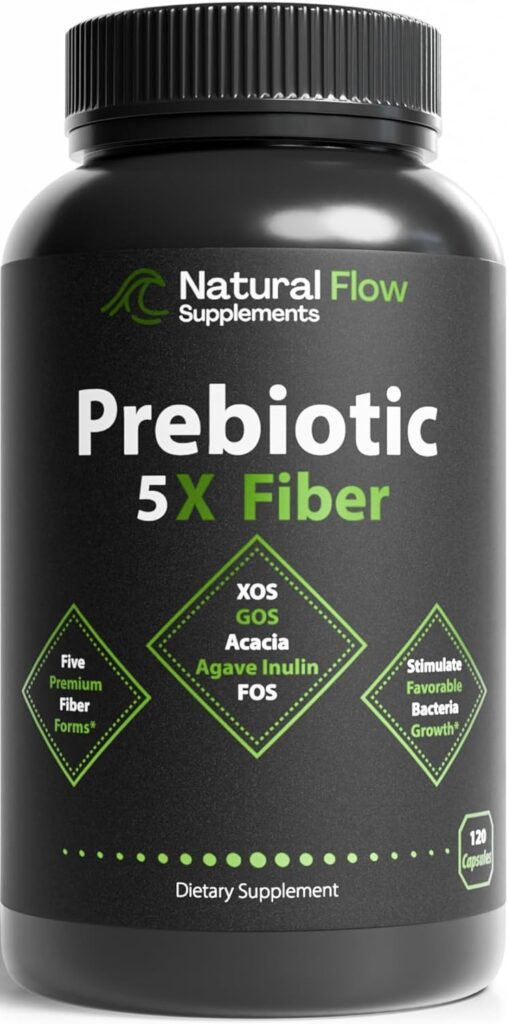Gut bloating is uncomfortable, frustrating, and can affect your daily life.
Whether it’s after meals, during stressful days, or as a recurring problem, bloating can make you feel sluggish and heavy.
The good news is that there are natural ways to ease gut bloating, improve digestion, and help your stomach feel lighter.
In this post, we are going to explore 5 ways to ease gut bloating, starting with the causes of it.
Let’s dive in!
What Causes Gut Bloating?
Bloating occurs when your digestive system is unable to efficiently break down food, leading to gas buildup in your intestines.
Common causes include poor gut bacteria balance, slow digestion, food intolerances, excess salt or carbonated beverages, and even stress.
Hormonal fluctuations and dehydration can also contribute, leaving you feeling tight and uncomfortable in your abdomen.
5 Ways to Ease Gut Bloating
1. Prebiotic Fiber Capsules
Prebiotic fiber is food for the beneficial bacteria in your gut, helping them thrive and improve digestion.
Taking prebiotic fiber capsules can help balance your gut microbiome, reduce gas, and ease bloating.
Over time, a healthy gut flora supports regular bowel movements, better nutrient absorption, and less discomfort after meals.
Out of all of the prebiotic fiber supplements I’ve tried, Natural Flow’s 5x Prebiotic Fiber is my personal favorite.
Natural Flow’s Prebiotic Fiber is an excellent choice for easing gut bloating.
Its blend of XOS, GOS, FOS, acacia fiber, and agave inulin nourishes the beneficial bacteria in your digestive system, helping to restore balance and reduce gas and discomfort.
Promoting a healthier gut environment, it supports better nutrient absorption and overall digestive comfort, making bloating a thing of the past.
Simply take 2 capsules per day and you’re good to go!
2. Drink Warm Water with Lemon
Starting your day with a cup of warm water and fresh lemon can stimulate digestion and encourage the elimination of trapped gas.
Warm liquids relax your digestive tract, while lemon promotes bile production, which helps break down fats and improve overall digestion.
Make this a morning ritual for a gentle, natural bloating remedy.
3. Practice Gentle Abdominal Massage
Massaging your abdomen in circular motions can help move trapped gas and relieve bloating.
Focus on the area around your belly button and lower abdomen, using gentle pressure.
Incorporating this practice before or after meals can reduce discomfort and support a smoother digestive process.
4. Avoid Carbonated Drinks and Excess Salt
Carbonated beverages introduce extra gas into your digestive system, while high-sodium foods can cause water retention and bloating.
Limiting these can dramatically reduce the feeling of fullness and abdominal pressure.
Swap fizzy drinks for water or herbal teas, and season meals with herbs instead of salt.
5. Eat Mindfully and Chew Thoroughly
Eating too quickly can lead to swallowed air, which contributes to bloating.
Take time to chew your food thoroughly, and practice mindful eating by focusing on your meal without distractions.
This simple habit can reduce gas buildup, improve digestion, and leave you feeling lighter after meals.
Ease Gut Bloating
Gut bloating doesn’t have to be a daily struggle.
By incorporating prebiotic fiber capsules, mindful eating habits, gentle massage, and smarter food and drink choices, you can significantly reduce bloating and support a healthier digestive system.
Over time, these strategies help you feel lighter, more comfortable, and more energized throughout the day.
Thank you for reading!
Affiliate Disclosure
Some of the links on this site are affiliate links. This means that if you click on the link and purchase the item, we may receive an affiliate commission at no extra cost to you. I only recommend products or services that I believe will add value to my readers, however, some (not all) do pay us to be on this blog. Your support and theirs help keep this blog running, and I genuinely appreciate it.
Medical Disclaimer
The information provided on this website is for educational purposes only and is not intended as medical advice. This blog or the writer is not a licensed healthcare professional, and the content should not be used as a substitute for professional medical diagnosis, treatment, or advice. Always consult with your physician or other qualified healthcare provider before starting any new treatment or making any changes to your healthcare routine.
